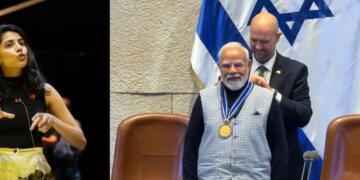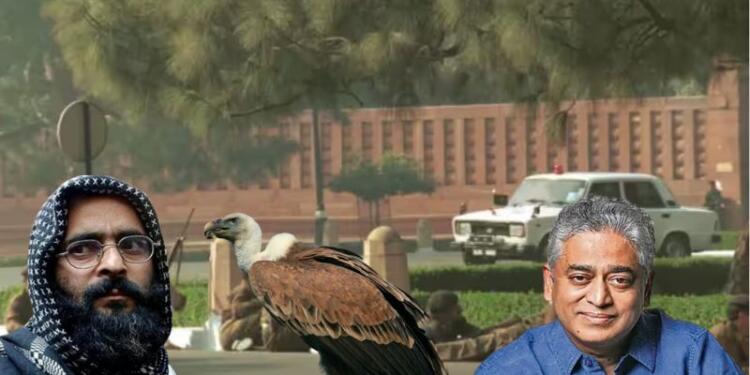Today is the 23rd Anniversary of the Indian Parliament attack, where five terrorists stormed the Indian Parliament premises by using fake stickers and ID cards. On that bleak December morning, the Parliament of India turned into a battlefield where heroism fought against terror. The sound of the rifle silenced six brave Delhi Police officers, two Parliament Security officials, and a poor gardener, whose sacrifices became eternal.
The terrorists targeted the heart of democracy, but their plans were foiled by the bravery of those who stood firm. Their blood showed the way for a resilient Indian society and reminded us that freedom comes at a high cost. The value that a hero possesses cannot be bought.
The terrorist attack on December 13, 2001, was devastating in nature, exposing certain key gaps in India’s security architecture. The Afzal Guru case was the most acrimonious component of the terror attacks’ aftermath. The accusation of assisting terrorists, the trial of the accusation, the sentencing, and, finally, the execution in 2013 exposed serious flaws in India’s approach to terror and justice.
A basic weakness in the judicial and political processes was exposed by the ten-year delay in executing the death sentence. Terrorist elements may gain strength from this indecision since it gave the impression that the institution was weak, which they took to mean that they were unable to act decisively. Deferrals were driven more by electoral politics and vote-bank considerations of UPA1 and UPA2 than by imperatives of national security, thus weakening further public confidence in the system.
Vulture Journalism and Construction of Victimhood
The media was also criticized for the way it shaped public opinion in the Afzal Guru case. Instead of highlighting the seriousness of the Parliament attack and the terror threat, the Darbari media dramatized the narrative and turned a ghastly terror case into a sociopolitical drama. In Darbari media’s reportage, Afzal Guru was the victim of systemic injustice, and much was said about his personal life, family troubles, and perceived marginalization. These malicious stories did all the Islamo-leftist ecosystem could to shift the spotlight away from the ghastly killing of the members of the Parliament to the bogus Muslim victimhood angle. They did everything to do romanticization of a convicted terrorist, creating sympathy in certain quarters and polarizing public opinion.
Now, it’s time to remember the vulture of Indian Journalism @sardesairajdeep
It was a great day for him when terrorists were killing our bravehearts. (3/n) pic.twitter.com/WBtqlz3i4f
— Lutyens Watch (@LutyensWatch) December 13, 2024
Good journalism works in tandem with information creation and diffusion to serve the public interest better when information is needed on salient issues like national security. In this case, the media handling of the Afzal Guru case suggests tendencies for sensationalism over realness. Sections of media only further complicated the discourse instead of simplifying it because such actions potentially undermine the nation’s paradigm in security. A commitment to balanced and factual reporting is crucial to ensure that media coverage contributes to public awareness rather than fueling polarization.
Also Read: How Rajdeep Sardesai put national security at stake in his rabid hunger for TRPs
The construction of a narrative of victimhood was a clear, multi-level strategy:
legal manoeuvres, for instance, through filing multiple mercy petitions prolonged the legal process, focusing attention both internationally and domestically;
petitions ostensibly aimed at garnering justice served as platforms for other forms of political and social commentary that undermined the primary issue: national security.
The case was the involvement of Afzal Guru in a terrorist act, but the media narrative and the appeasement politics launched downright narrative of falsehoods to present it as a persecution of a minority for just being Muslim. However, Muslims being a Minority in India is itself a flawed concept, where Shikhs, Buddhists and Jains are in much more in lesser numbers.
Appeasement Over National Security
The Afzal Guru case has far-reaching implications for the broader societal and political dimensions. It highlighted the fragile balance between strong national security and democratic principles which were blatantly misused to prolong Justice. It would be better to term it appeasement politics over national security. The protracted legal process, though essential to provide fairness, unwittingly seeded uncertainty and undermined public confidence in the system. This case again exhibits the thin line between legitimate legal alternatives and the strategic manipulation of judicial procedures to serve political and ideological ends. It also demonstrated the power of media narratives in shaping public perception.
The case also brought deep weaknesses in India’s national security infrastructure. The long judicial process, characterized by multiple appeals and mercy petitions, exposed the vulnerability of the legal system to strategic delays. This not only eroded public confidence in the judiciary but also sent mixed signals to terrorist networks, which might embolden them. The inability to swiftly and decisively address threats to national security revealed a lack of coordination and clarity in counterterrorism strategies. Such institutional weaknesses, if not addressed, risk undermining the nation’s ability to combat future threats effectively.
Critical Observation and Conclusion
The justice system, as one of the main pillars in the maintenance of national security and democratic ideals, must navigate a difficult terrain in balancing the requirement for full investigation with the necessity for the fast conclusion. The protracted legal process only ends up creating ambiguity, emboldening terrorist threats while diminishing public trust in the justice system. A robust and efficient judicial system is necessary to convey the message that the state is devoted to defending its citizens and the rule of law.
Moreover, mass media influences and creates public perception and consciousness of sensitive national security matters. Responsible journalism is more than reporting; the commitment is to a balanced truth that is factually presented and not sensationalized or used to divide. National security calls upon journalists to shoulder the massive responsibility of context-providing rather than resorting to inflammatory rhetoric to contribute to nuanced public debate that supports, rather than undermines, the security paradigm in the nation. Sensationalist media approaches would instead need to be informed, taking care not to blur but to clear up the confusion and intricate national security problems at hand.
In conclusion, the Parliament attack and its aftermath form a critical case study in understanding the interplay between national security, misuse of judicial processes, media representation, and political strategy. The sacrifices of those who defended the Parliament on that bleak December morning remind us of the invaluable price of freedom and the enduring value of heroism. It is of prime importance that, as a nation, we respect this legacy by rectifying systemic flaws this tragedy exposed and building a resilient framework upholding security and democratic values. Only through such incidents can we ensure the solidity of our democracy’s pillars before future challenges.

























